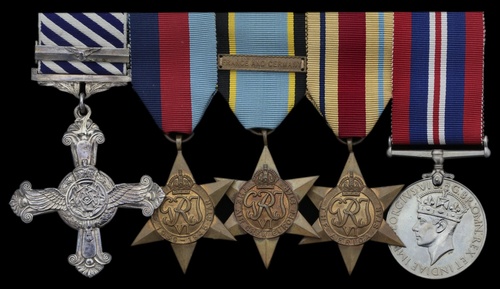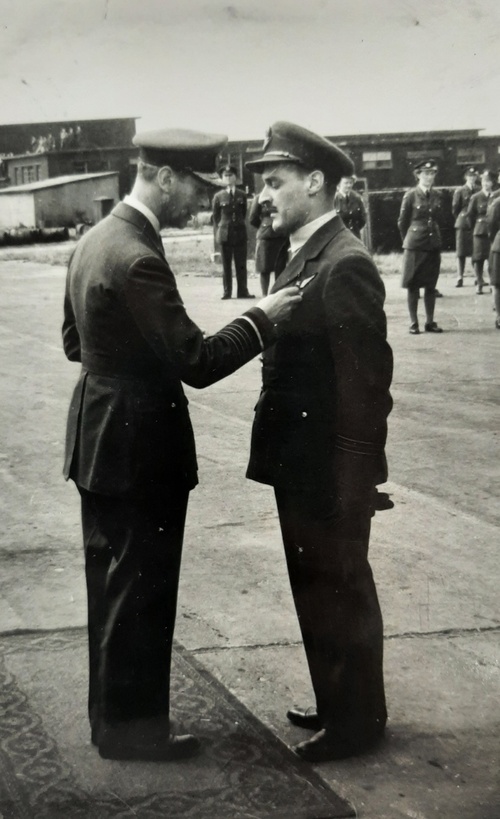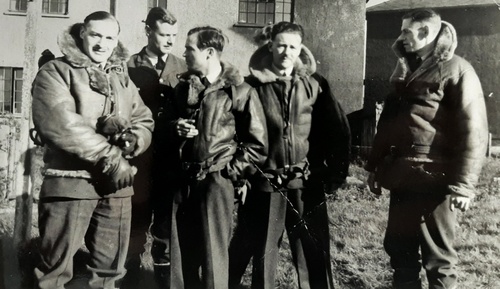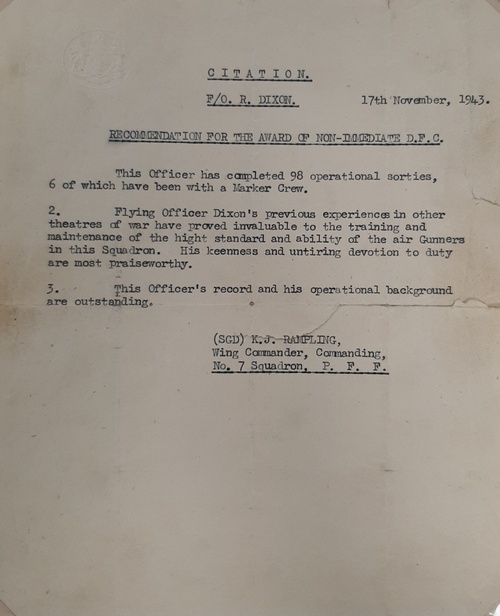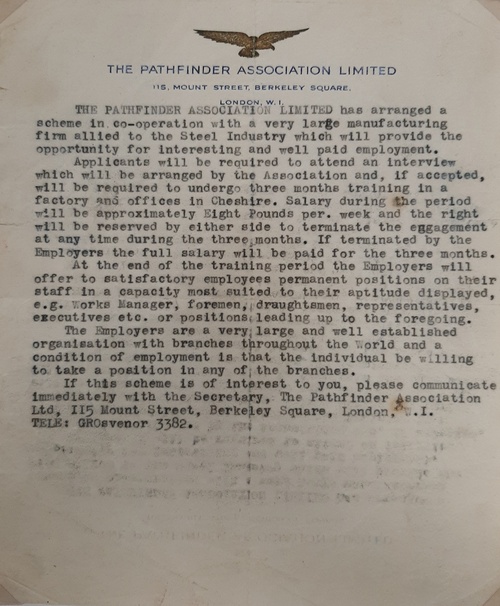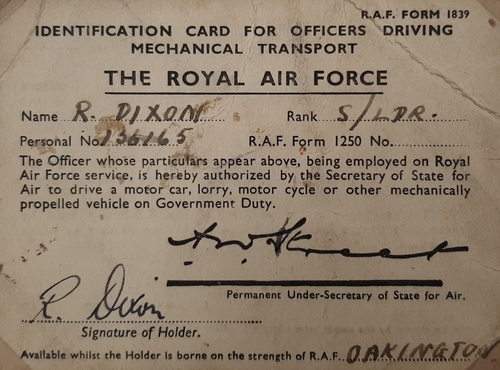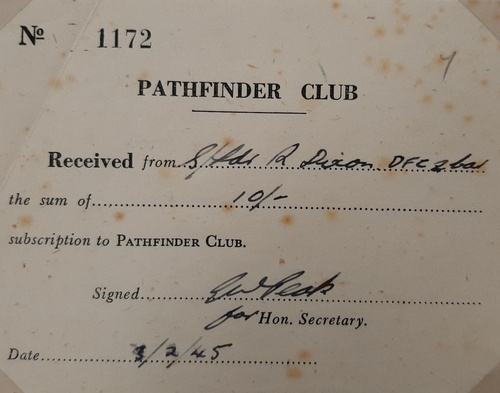Auction: 22002 - Orders, Decorations and Medals
Lot: 233
We went to Stuttgart on the night of July 28th, 1944, in Lancaster U-Uncle, and we had the task of Master of Ceremonies (the title later became Master Bomber). The gunnery leader, Squadron Leader Dixon, stood in for us as rear gunner. He was first class at his job, and flew with us on about six occasions. I had a faith in him just born out of intuition, and from watching the way he went about his job. After being over the target area from beginning to end of the raid, I gave Alan a course for home, and we left as planned, Within 15 minutes, Dickie called up in the approved manner, "Rear Gunner to Pilot, there's fighters about". Back came, "OK Rear Gunner". Then - "Rear Gunner to Pilot, fighter starboard quarter, prepare to corkscrew starboard." Just then the mid-upper gunner said "I think he's coming over to port." Then Dickie called out, "Starboard, go." Alan, in his best top drawer voice said "Now what do you want? Port or Starboard" Back came the prompt reply from Dickie, "Starboard, you -, down starboard, rolling back up port." The dull rattle of the Brownings crept over the intercomm. Then the terminating punch-line from Dick, "Got the Bastard". Confirmed by the mid-upper gunner.
(Pathfinders at War, refers)
The 1944 D.F.C. and Bar group of five awarded to Squadron Leader R. Dixon, Royal Air Force, who saw service as a Pathfinder and Air Gunner, rising from the rank of Flight Sergeant to Squadron Leader
Distinguished Flying Cross, G.VI.R., dated to the reverse '1944', with Second Award Bar, dated '1944'; 1939-45 Star; Air Crew Europe Star, with France and Germany clasp; Africa Star; War Medal 1939-45, sold together with a named and addressed O.H.M.S. box of issue, mounted as worn, good very fine (5)
D.F.C. London Gazette 18 January 1944, the original recommendation states:
'This Officer has completed 98 operational sorties, 6 of which have been with a Marker Crew.
2. Flying Officer Dixon's previous experiences in other theatres of war have proved invaluable to the training and maintenance of the high standard and ability of the air Gunners in this Squadron. His keenness and untiring devotion to duty are most praiseworthy.
3. This Officer's record and his operational background are outstanding.'
Second Award Bar to D.F.C. London Gazette 8 December 1944, the original citation states:
'Squadron Leader Dixon has almost completed his second operational tour. He had, at all times, set an admirable example of efficiency and determination which has been a source of inspiration to all gunners in his Squadron. By his skill and initiative he has largely contributed to the success of many missions. On one occasion, when acting as gunner in the crew of the Master Bomber, he destroyed an enemy fighter which attacked his aircraft.'
Rene Dixon lived at Alma Place, Bradford and was educated at Hanson High School. Enlisting with the Royal Air Force Volunteer Reserve in 1939 with the rank of Aircraftman Class II, he proceeded to fly with No. 9 Squadron in France as Flight Sergeant (Air Gunner) before switching focus to Germany and Italy. Here they struck at targets such as Genoa, Mannheim and Kiel before Dixon was transferred to No. 104 Squadron on 11 October 1941 and on 16 October left as part of the detachment deployed to Malta.
Their first mission here almost proved to be Dixon's last as the Wellington in which he was rear-Gunner for crash-landed. The front-Gunner was killed and the rest of the crew injured; Dixon managed to escape injury. He kept flying against targets in Italy and North Africa, on one notable occasion tangling with an Italian FIAT C.R.42 during which he fired 70 rounds.
The Squadron moved to North Africa on 3 June 1942 but Dixon did not remain with them for long, being transferred to No. 27 O.T.U. at Lichfield. Even while here he occasionally took part in operations including the 30 May 1942 raid over Cologne, as stated in the recipient's logbook: 'first mass raid on German cities'. Transferring to No. 1 Air Armament School on 11 July 1942 he served between there and Lichfield for the remainder of the year, being Commissioned Flying Officer on 17 September 1942 and further promoted Flying Officer on 22 March 1943.
Upon joining No. 7 Squadron in September 1943 Dixon flew a number of raids over Germany, notably three over Berlin in late November 1943. His first raid in the Master Bomber was over Cagny on 18 July 1944; on the next raid he took his first confirmed kill, a J.U.88. A letter from a former crewmate raises the possibility of another kill on this same mission but sadly this remains unconfirmed. The role of Master Bomber was a dangerous one as Dixon's crewmate emphasises, stating:
'Bearing in mind that our task as Master Bomber involved arriving first, marking the target by dropping Target Indicators, and then superintending over the progress of the raid until completion (probably 20 minutes). Being the last to leave meant that we must have appeared as a blip upon many German Radar screens, and were subsequently sought as a target by Flak and night fighters.'
Promoted Flight Lieutenant on 28 July 1944 and later Squadron Leader he was decorated with the Bar to his D.F.C.; sold together with copied research including, operations reports, London Gazette entries and newspaper extracts as well as an extract from Pathfinders at War, R.A.F. lists and photographs together with an archive of original research comprising:
i)
The recipient's Flying Log Book.
ii)
Two R.A.F. cap badges.
iii)
original newspaper clippings.
iv)
original recommendations.
v)
service and release book.
vi)
Pathfinder Association letter.
vii)
Pathfinder club membership slip.
viii)
R.A.F. Officers I.D. card for driving mechanical transport.
Subject to 20% VAT on Buyer’s Premium. For more information please view Terms and Conditions for Buyers.
Sold for
£3,800
Starting price
£1900

